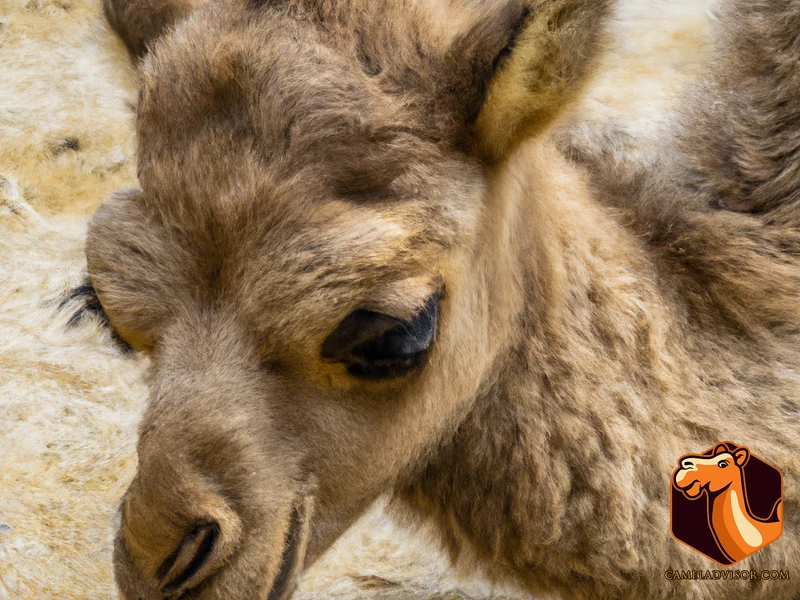Welcoming a newborn camel into the world is an exciting and precious experience. This new addition to your herd represents hope and growth for the future. However, like all infants, newborn camels require special attention and care. It is common for them to struggle during their early days, and it can be confusing for camel owners to determine whether their newborn is experiencing normal growing pains or if help is needed. In this article, we will discuss the signs of struggle in newborn camels and provide tips on how to recognize when they need help. We’ll also cover what you can do to assist them and when to seek professional help. By learning to recognize these warning signs, you can ensure that your newborn camel receives the proper care and attention it needs to thrive.
Contents
- Signs of Struggle
- What You Can Do
- When to Seek Professional Help
- Conclusion
-
Frequently Asked Questions
- What is the gestation period for camels?
- How do newborn camels differ from other ungulates?
- How long do newborn camels depend on their mother for milk?
- Do newborn camels need specific vaccination?
- What should you do if you find a newborn camel alone in the wild?
- Can a newborn camel survive without its mother?
- How long does it take for a newborn camel to reach its full size?
- What is the average weight of a newborn camel?
- Do female or male camels produce milk?
- Can a newborn camel be bottle fed?
- References
Signs of Struggle

As a newborn camel owner, it is important to keep a watchful eye on your baby camel to ensure their health and well-being. Unfortunately, sometimes newborn camels may struggle and show signs of distress. It can be perplexing to determine when a newborn camel is in need of help. In this section, we will discuss various signs of struggle that you may notice in your newborn camel. It is crucial to recognize these signs and act quickly to ensure the health and survival of your camel. For more information about newborn camel care, take a look at our guide on caring for newborn camels.
Difficulty Standing
When a newborn camel has difficulty standing, it could be a sign that the young animal is struggling and needs help. This is a critical period for the newborn camel’s development, and it’s important to be observant and take appropriate action. In the table below, we outline some signs that may indicate difficulty with standing.
| Signs of Difficulty Standing | Description |
| Weakness | The newborn camel may struggle to stand or may collapse quickly after standing. |
| Incoordination | The young animal may have trouble balancing and may stumble frequently. |
| Wobbliness | The camel may have a lack of coordination in its legs, causing it to wobble when trying to stand or walk. |
If you notice any of these signs, it’s important to take action. The first step is to check on the camel’s overall health to ensure there are no underlying issues causing the problem with standing. Providing proper nutrition and hydration can also help improve the calf’s strength and muscle development. Additionally, it may be necessary to assist the camel when standing or monitor its vital signs to ensure that it is safe and healthy.
For more information on caring for newborn camels, check out our article on newborn camel care.
Lack of Appetite
One of the signs that a newborn camel may be struggling is a lack of appetite. Newborn camels need to eat frequently to stay healthy and strong, so if they are not showing interest in feedings, it could be cause for concern.
If you notice that your newborn camel is not eating as much or as often as usual, it may be a sign of an underlying health issue. This could include anything from infections to digestive problems, so it’s important to keep a close eye on your camel’s behavior and health.
To address a lack of appetite in your newborn camel, there are a few things you can do. First, make sure that their feeding schedule is consistent and that they are being given the appropriate amount of milk or formula for their age and size. It may be necessary to consult a veterinarian or animal nutritionist to determine the right feeding plan for your camel. You can also try offering different types of feed or adjusting the temperature of their milk to make it more appealing.
If your newborn camel’s lack of appetite persists, it may be necessary to seek professional help. A veterinarian can examine your camel and diagnose any underlying health issues that may be causing the problem. They may also be able to provide advice on feeding schedules and nutrition.
To learn more about caring for a newborn camel, including feeding schedules and environmental considerations, check out our article on newborn camel environment.
Excessive Crying
A newborn camel that is excessively crying may be an indication that something is wrong. Camels will typically cry when they are hungry, thirsty, or uncomfortable. However, if the crying is ongoing and appears to be beyond the normal amount, you should check to see if there are any other signs of distress.
Excessive crying can be caused by a variety of issues, such as dehydration, colic, hunger, illness, or stress. To determine the cause of your newborn camel’s crying, you can look for other signs of discomfort, such as panting, sweating, or lethargy. Additionally, you can check the calf’s temperature using a digital thermometer to determine if there is a fever.
To address excessive crying, provide plenty of fluids to prevent dehydration, try to identify the underlying cause of the distress, and carefully monitor the calf’s behavior. If the calf is crying due to hunger or thirst, bottle feeding may be necessary. On the other hand, if the calf refuses to drink, then it can be a sign of another underlying health issue that requires medical attention.
It’s essential for the well-being of your newborn camel that you keep a regular feeding schedule, and make sure that they are getting enough to eat and drink. Not properly feeding a newborn camel can cause various health problems. If you are having difficulty with the feeding process, or have concerns about your newborn camel’s health, seeking professional help can be the best course of action.
Excessive crying in a newborn camel can be a sign that something is wrong. You must monitor the calf’s behavior and look for signs of distress, identify the underlying cause, and provide appropriate care. Being aware of the warning symptoms and understanding what to do when your calf is crying excessively is crucial for maintaining their health and well-being.
Abnormal Bowel Movements
Abnormal bowel movements can be a sign that a newborn camel is struggling and needs help. It is important to monitor a newborn camel’s bowel movements to ensure they are regular and healthy. Abnormal bowel movements can include diarrhea, constipation, or passing unusual colored or smelly stools. These symptoms may suggest a digestive issue or infection, which can be dangerous for a fragile newborn camel.
To monitor a newborn camel’s bowel movements, it is helpful to keep a record of when they defecate and what it looks like. This can be done using an html table. The table can have columns for the date and time, consistency, color, and any other specific notes. By tracking bowel movements, you can easily detect any abnormalities and monitor progress.
It is also important to note that abnormal bowel movements can be related to health problems or feeding issues. For example, if a newborn camel is not receiving enough colostrum, they may experience diarrhea or constipation. Similarly, if a newborn camel is fed too much too quickly, it may cause digestive upset. Proper feeding and weaning are essential for a healthy newborn camel.
If you notice any signs of abnormal bowel movements in a newborn camel, it is important to take action. Depending on the severity of the situation, you may need to bottle feed the camel or provide medication to treat any infections. Constipation can be relieved by providing more fluids and fiber in the diet. Diarrhea may require medication to prevent dehydration.
If the situation does not improve, it may be necessary to seek professional help from a veterinarian. A vet can provide a physical exam and may recommend additional tests or treatments. Prompt attention to abnormal bowel movements can help prevent serious health complications and keep the newborn camel healthy and thriving.
Lethargy
One of the signs that a newborn camel may need help is lethargy. Lethargy can be defined as a lack of energy or enthusiasm, and when it is exhibited by a newborn animal, it can be a cause for concern. A lethargic newborn camel may appear weak and have trouble standing, and it may not show an interest in nursing or interacting with its mother.
To determine if a newborn camel is lethargic, look for the following signs:
| Signs of Lethargy in a Newborn Camel | Description |
|---|---|
| Weakness | The newborn camel may struggle to stand and move around, and may appear wobbly or unsteady. |
| Lack of Appetite | The camel may not show interest in nursing or may not be able to stand up to nurse. |
| Drowsiness | The camel may appear sleepy or unresponsive, and may not react to stimuli in its environment. |
| Low Body Temperature | The newborn camel’s body temperature may be lower than normal, indicating a lack of energy and vitality. |
If you notice any of these signs in a newborn camel, it may be necessary to intervene and provide assistance. Lethargy can be a sign of a more serious problem, such as dehydration, infection, or an underlying health condition. Providing proper nutrition, such as bottle-feeding or ensuring the camel receives sufficient colostrum, can help to improve the camel’s energy levels and overall health.
In addition to providing proper nutrition, it may be necessary to assist the newborn camel with standing and moving around. This can be done by providing support under the camel’s belly as it attempts to get up, or by gently lifting the camel into a standing position. It is important to monitor the camel’s vital signs, including body temperature and heart rate, and to administer medication if necessary to treat any underlying health issues.
If interventions such as these do not improve the newborn camel’s condition, it may be necessary to seek professional help from a veterinarian or animal health expert. In some cases, lethargy can be a sign of serious complications, such as respiratory distress or injury, and prompt medical attention can be lifesaving.
Recognizing the signs of lethargy in a newborn camel is an important part of ensuring that the animal receives the care and attention it needs to thrive. By providing proper nutrition, assistance with standing and moving, and monitoring vital signs, you can help improve a lethargic newborn camel’s condition and prevent more serious health issues from developing. Consider some tips for newborn camel training to make the process easier, so a young camel could adjust to the new world outside of the mother’s womb.
What You Can Do
As a concerned caretaker, it’s natural to feel helpless when observing a struggling newborn camel. However, there are several actions you can take to provide support and give the camel the best chance at a healthy life. By ensuring proper nutrition, helping with standing, monitoring vital signs, and administering medication if necessary, you can make a significant impact on the wellbeing of your newborn camel. Let’s explore these steps in more detail.
Provide Proper Nutrition
It is essential to provide proper nutrition to a newborn camel in order to support their growth and development. This can be achieved through a combination of natural feeding and supplementation. Here are some tips on how to provide proper nutrition to a newborn camel:
| Tip | Description |
|---|---|
| Natural Feeding | Camel milk is the best source of nutrition for a newborn camel. The milk provides all the necessary nutrients, including protein, vitamins, and minerals, required for its growth and development. |
| Supplementation | If for some reason, natural feeding is not possible, then the supplementation can be given to fulfill the nutrition requirement of the newborn. Camel milk-based formula should be given with the help of a bottle or a stomach tube. Additionally, the mother’s colostrum, which is rich in antibodies, should be given within the first few hours of birth to provide immunity. |
| Frequent Feeding | Newborn camels should be fed frequently, usually every two to three hours, to ensure that they receive adequate nutrition. A well-fed newborn camel is a healthy camel that is less likely to require medical attention. |
| Monitoring | It is important to monitor the baby camel’s weight and ensure that it is gaining weight at a healthy rate. If it is not gaining weight, then it may be necessary to increase the feeding frequency or amount or consult with a veterinarian. |
By following these tips, you can help ensure that your newborn camel receives the proper nutrition that it needs to grow and develop into a healthy adult camel.
Assist with Standing
Assisting a newborn camel with standing can be a challenging task that requires patience and care. Here are some helpful steps to assist with standing:
- Safety first: Before attempting to assist with standing, ensure the area is safe and free from any sharp objects or debris that could harm the newborn camel.
- Slowly lift: Approach the newborn camel from the side and gently place your hands under its stomach. Slowly lift the baby camel up, supporting its weight until it can stand on its own.
- Use a sling: If the newborn camel is too weak to stand on its own, a sling can be used to provide extra support. Place the sling under the camel’s stomach and lift it up into a standing position. You can slowly lower the camel down to the ground and repeat the process until it gains the strength to stand on its own.
- Provide support: You can provide extra support to the newborn camel by using a bale of hay or a rolled-up towel as a prop. Place the prop under the camel’s chest to help it balance as it learns to stand on its own.
- Be patient: It can take hours or even days for a newborn camel to learn how to stand properly. Be patient and continue to assist as needed until the camel gains its footing.
Remember to monitor the newborn camel closely and provide it with the necessary care and attention during this crucial time. With proper assistance and care, your baby camel will soon learn how to stand on its own and eventually thrive.
Monitor Vital Signs
It is important to monitor the vital signs of a newborn camel who may be in distress. This will help you keep track of changes in their health and allow you to take action when necessary. The following table highlights the various vital signs to monitor and what ranges are considered normal for a newborn camel.
| Vital Sign | Normal Range | Importance |
|---|---|---|
| Heart Rate | 90-130 beats per minute (bpm) | A high or low heart rate can indicate stress or illness. |
| Respiratory Rate | 20-40 breaths per minute (bpm) | Abnormal breathing can signal respiratory distress or other issues. |
| Body Temperature | 100-102.5 degrees Fahrenheit (37.7-39.2 degrees Celsius) | Camels are highly sensitive to heat and cold, so it’s important to monitor their body temperature to ensure they are within a safe range. |
| Weight | Varies based on breed and gender | Tracking weight gain or loss can help you determine if the camel is receiving proper nutrition. |
In addition to monitoring vital signs, it is important to keep detailed records of any changes or abnormalities noticed in the newborn camel’s health. This will help you track any changes over time and provide the necessary information to a veterinarian, if needed. Keeping a notebook or chart to document changes in vital signs, weight, and behavior can be a valuable tool in ensuring the health and wellbeing of the newborn camel.
Administer Medication if Necessary
In some cases, administering medication may be necessary to help a struggling newborn camel. It is important to remember that only a qualified veterinarian should prescribe and administer medications to animals. Here are some common medications that may be necessary for a newborn camel:
- Antibiotics: If the newborn camel is suffering from an infection, such as pneumonia, antibiotics may be necessary to fight off the infection.
- Electrolytes: If the newborn camel is dehydrated, electrolytes may be necessary to restore proper fluid balance in the body.
- Vitamins: In some cases, the newborn camel may lack certain essential vitamins that are necessary for growth and development. A veterinarian may prescribe vitamin supplements to help the camel thrive.
- Painkillers: If the newborn camel has experienced injury or trauma, such as a broken bone, painkillers may be necessary to manage the pain and make the camel more comfortable.
- Anti-inflammatory medication: If the newborn camel is suffering from inflammation, such as with joint or muscle injuries, anti-inflammatory medication may be necessary to reduce swelling and alleviate pain.
Administering medication to newborn camels should be done with caution, as the wrong dosage or medication can cause harm to the animal. Always consult with a veterinarian and follow their prescribed instructions carefully. By providing proper nourishment, assistance, monitoring, and medication when necessary, you can help ensure the health and well-being of a struggling newborn camel.
When to Seek Professional Help
As a caretaker of a newborn camel, it’s important to be aware of potential issues and when to seek professional help. Identifying when your camel is in distress can be a daunting task, but understanding the signs of when it’s time to seek medical attention is crucial in ensuring the health and well-being of your camel. In this section, we’ll explore a few of the red flags that indicate it’s time to reach out to a professional for assistance. Keep a watchful eye out for these warning signs, and don’t hesitate to take action if you notice any of them in your newborn camel’s behavior.
Complications During Birth
Complications during birth can be a serious concern for newborn camels. Some of the most common issues are listed below:
| Dystocia: | Dystocia refers to a difficult or prolonged labor. It can be caused by a number of factors, including fetal malposition or maternal issues such as a small pelvis or obesity. If a labor is prolonged, a veterinarian should be consulted to assess the situation. |
| Umbilical cord complications: | Problems with the umbilical cord, such as being wrapped around the neck, can cause distress in the newborn camel. This can lead to respiratory problems or other complications, so it is important to monitor the situation and seek professional help if necessary. |
| Malformation or abnormality: | In some cases, a newborn camel may have a birth defect or malformation that can cause complications during birth. This can include issues such as cleft palate, limb deformities, or other abnormalities that can make it difficult for the calf to survive. A veterinarian should be consulted to determine the best course of action. |
| Breech birth: | If a calf is born in the breech position, it can cause stress on the calf and make it difficult for them to breathe. This can be a life-threatening situation, so immediate action is required to help the calf breathe and regulate their body temperature. |
It is important to monitor the birthing process closely and seek professional help if any complications arise. Quick action can sometimes mean the difference between life and death for a newborn camel.
Respiratory Distress
Respiratory distress is a serious concern in newborn camels, typically arising from complications during birth or respiratory infections. Recognizing the signs of respiratory distress as early as possible is crucial for the health and survival of the camel.
Signs of respiratory distress
Camels suffering from respiratory distress display various physical signs. These include:
| Signs of Respiratory Distress | Description |
|---|---|
| Rapid breathing | A higher than normal breathing rate may indicate that the camel is struggling to breathe. |
| Flaring nostrils | The nostrils may flair out widely as the camel takes in air rapidly. |
| Open-mouthed breathing | The camel may breathe through an open mouth, as it tries to get enough air into its lungs. |
| Wheezing or crackling sounds | Noises can often be heard when the camel inhales or exhales, signaling that there may be blockages or issues within the lungs. |
| Cyanosis | A blue or gray tinge to the lips or gums can indicate a lack of oxygen in the bloodstream. |
Causes of respiratory distress
There are several factors that can lead to respiratory distress in newborn camels, including:
- Complications during birth, such as prolonged labor or positioning issues
- Respiratory infections, including pneumonia or bronchitis
- Viral infections such as camel pox, Rinderpest and Rift Valley fever virus
- Inhalation of foreign materials, such as dust or sand
- Injury to the chest or lungs
Treatment for respiratory distress
If a newborn camel shows signs of respiratory distress, it is important to seek veterinary attention immediately. The vet will likely perform a thorough physical examination, including blood work and X-rays, to determine the cause of the distress. Depending on the cause, treatment may include:
- Antibiotics to treat bacterial infections
- Anti-inflammatory medication
- Oxygen therapy to assist with breathing
- Suctioning to remove blockages from the airway
- In severe cases, intubation may be necessary to maintain a stable airway.
It is important to remember that respiratory distress can quickly become life-threatening, and early intervention is necessary for the best possible outcome.
Injury or Trauma
Injuries and trauma in newborn camels can be serious and require immediate attention. These may result from accidents, falls or even during the birthing process. It is important to monitor your newborn camel closely and watch for any signs of injury or trauma. Some of the signs indicating a problem include excessive crying, lethargy, and difficulty standing.
If you suspect that your newborn camel has suffered an injury or trauma, the first step is to assess the situation and determine the extent of the damage. Check for any physical injuries such as broken bones, wounds or bleeding. If you have any concerns or questions, it is always best to consult with a veterinarian.
If your newborn camel has sustained an injury or trauma, it is important to provide proper nutrition and hydration to help them recover. You should also facilitate rest and relaxation to avoid aggravating the injury.
Additionally, you should keep the wounded or injured area clean and protect it from any further injury or infection. Administering medication may also be necessary to control pain and reduce inflammation.
It is important to note that injuries and trauma, especially those resulting from accidents, can be difficult to manage and may require specialized care. Seeking professional help from a veterinarian is highly recommended.
Injuries and trauma can cause serious harm to your newborn camel. If any signs of injury or trauma are observed, it’s important to be prepared to provide proper care and seek professional help promptly.
Dehydration
Dehydration is a serious concern for newborn camels, particularly in hot and arid climates. If not addressed promptly, dehydration can lead to other health complications and even death. Here are some signs to watch for to determine if a newborn camel is dehydrated:
- Dry mouth and nose: Check the mouth and nose of the camel for dryness. In healthy camels, these areas should be moist.
- Reduced urine output: Monitor the amount and frequency of urination. A decrease in frequency or amount may be a sign of dehydration.
- Dark urine: If you notice that the urine is dark yellow or brown, it could indicate dehydration.
- Weakness and lethargy: Dehydration can lead to a lack of energy and enthusiasm for play and exploration, which may be represented by lethargy and weakness.
- Loss of skin elasticity: You can test for dehydration by pinching the skin on the camel’s neck. In a hydrated camel, the skin will “bounce back” quickly. In a dehydrated camel, the skin may remain pinched or take longer to return to normal.
If you suspect that a newborn camel is dehydrated, act quickly to address the problem. Offer frequent sips of water to the camel to restore fluids to the body. In severe cases, fluids may need to be administered via oral rehydration solutions or IV fluids. Additionally, monitor the camel’s behavior and overall health, and consult with a veterinarian if you feel that the dehydration is severe or not being resolved by your attempts to rehydrate the camel. Remember, early intervention is crucial for the health and well-being of your newborn camel.
Conclusion
In conclusion, recognizing when a newborn camel needs help is crucial to ensure their survival and wellbeing. It can be challenging to identify signs of struggle in these animals, but paying close attention to their behavior and physical condition can make a significant difference.
Remember, difficulty standing, lack of appetite, excessive crying, abnormal bowel movements, and lethargy are all red flags indicating that something might be wrong with the newborn camel. As a caretaker, it is essential to provide proper nutrition, assist with standing, monitor vital signs, and administer medication if necessary.
However, there are some instances where seeking professional help is crucial. Complications during birth, respiratory distress, injury or trauma, and dehydration are all situations that require urgent medical attention. As a responsible caretaker, it is your duty to seek professional help promptly if you notice any of these symptoms in your newborn camel.
In summary, taking care of newborn camels is a challenging but rewarding experience. With proper attention and care, you can help these animals thrive and grow healthy. Remembering the signs of struggle, knowing what to do, and seeking professional help when necessary can make all the difference.
Frequently Asked Questions
What is the gestation period for camels?
The gestation period for camels is around 12 to 14 months.
How do newborn camels differ from other ungulates?
Newborn camels differ from other ungulates because they stand within 30 minutes of birth and start walking shortly after that.
How long do newborn camels depend on their mother for milk?
Newborn camels depend on their mother for milk for about 6 to 18 months.
Do newborn camels need specific vaccination?
Yes, newborn camels need specific vaccination to prevent respiratory infections and other diseases.
What should you do if you find a newborn camel alone in the wild?
If you find a newborn camel alone in the wild, it’s best to leave it alone and not interfere with its natural habitat.
Can a newborn camel survive without its mother?
Newborn camels have a better chance of survival with their mother’s milk and care, but they can still survive on their own in some cases.
How long does it take for a newborn camel to reach its full size?
It takes about two to three years for a newborn camel to reach its full size.
What is the average weight of a newborn camel?
The average weight of a newborn camel is around 80 pounds.
Do female or male camels produce milk?
Female camels produce milk for their young, while male camels do not.
Can a newborn camel be bottle fed?
Yes, a newborn camel can be bottle fed if its mother is unable to produce milk or dies.







